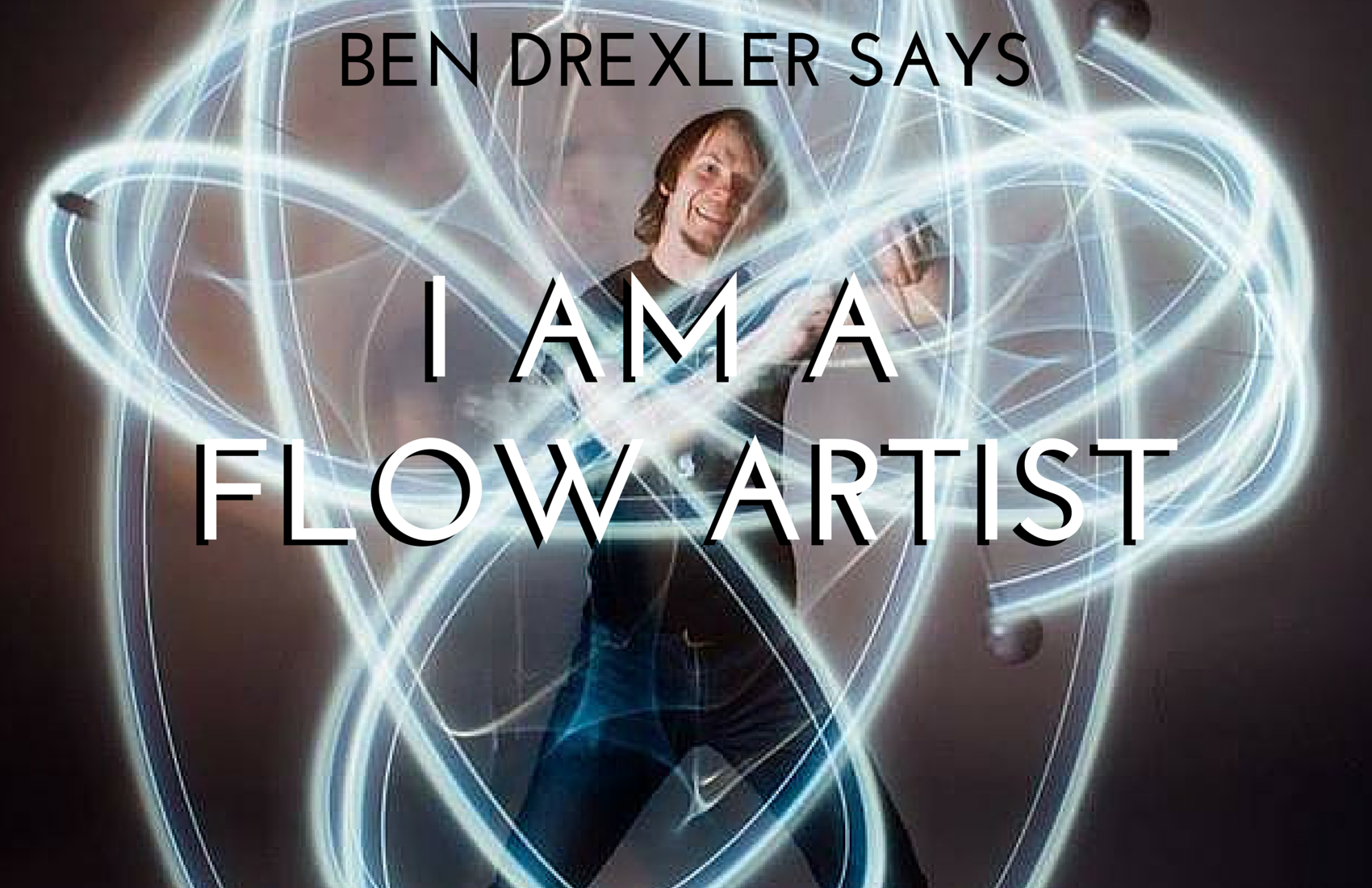Well, it’s time to admit something that I once would have scoffed at:
I am a flow artist.
For many years, I’ve made my skepticism of our appropriation of the word “flow” very vocal for a variety of reasons, but I’ve come to the conclusion at this point that it’s the term that most accurately describes my inspirations, motivations, and interest in spinning. More than that, I’ve noticed a disturbing trend toward the public shaming of people who do identify as flow artists in a way that I think is damaging to our community. Flow arts is far from a perfect term, but it’s still the best one we have.
Flow is a problematic word for us to own for reasons that have been well documented at this point. Even beyond my own personal confusion over our appropriation of the term “flow,” I remember at one point feeling as though the cult of flow had taken over the spinning community in some deeply disturbing ways. At one regional burn in particular, I remember seeing a young woman come off of a burn chastising herself for not finding her flow and I was tempted to ask: “Does that mean you didn’t have fun?” I was baffled that the pursuit of this very nebulous concept had become so primary to her spinning that it eclipsed the simple joy that she experienced while doing it.
Ultimately, I think, this is the reason any one of us spins a prop–because we enjoy it. Whether we do it to meditate, dance, for physical fitness, perform, seek discipline or peace, or even just want to spin a little with our friends, it is an act that brings joy into our lives. And yet somehow it becomes incredibly divisive.
Tech Spinning turning into Circus
While we may have a plethora of reasons why we love to spin, the technical spinning world has long had a problem with this kind of diversity–especially with the more casual spinners who approach the art just for fun. We’ve frequently behaved as though acknowledging the weekend warriors as peers somehow is insulting to the level of work we’ve put into our own art. In the past couple years, many in the tech community have doubled down on this attitude by replacing tech with circus as the platonic ideal to strive for. It’s easy to see why: it’s virtuosos getting appreciated for their hard work, the ideal state for penniless tech masters who want to spend all their time practicing only to discover there is no job description that includes “poi virtuoso.”
And for me there’s just one problem with this approach: circus doesn’t appeal to me. For one thing, there’s the attitude: where tech spinners have a reputation for being stuffy and taking themselves too seriously, when spinners take up juggling and balancing, their sense of entitlement seems to shoot through the roof. The focus on virtuosity really misses the fact that virtuosity is seldom accessible to larger audiences. Traditional circus has seen attendance plunge in recent decades with only Cirque Du Soleil shows returning huge revenues in a digital marketplace that more and more frequently rejects entertainment not delivered on the customer’s schedule rather than the performer’s. One of the biggest differences between Cirque Du Soleil’s approach and traditional circus is the (at times modest) attempt at storytelling and character development during, around, and in the many acts that they put onstage. I’ve yet to see any of the tech spinners who’ve embraced circus as their savior take up any of these elements of performance as noble goals. After all, who needs story when you can juggle 7 clubs? Finally, my personal opinion is that circus tends to elevate virtuosity over beauty of form. As an audience member, balancers frequently look as though they’re in pain and I can barely spot the difference once a juggler introduces more than 5 objects into their routines.
Embrace your own, but don’t shame or bully others artistic choices
While my own tastes don’t gel well with the circus world, let me be perfectly clear: if the circus aesthetic appeals to you, then absolutely pursue it! We all find inspiration in a variety of places and I’m inclined to think them all equally valid. Right now, mine happen to come more in the dance and theater world. If yours is based in circus, then embrace it. The problem as I see it comes about when one person comes to believe their choice is more “right” than someone else’s.
Without a doubt, the most troubling aspect of the many attempts I’ve seen to integrate the circus and flow arts is what I’ve come to think of as “flow-shaming,” the public shaming, condemnation, or bullying of individuals who don’t self-identify as circus artists. Most frequently, this takes the form of self-identified circus artists insisting that flow artists don’t take their art seriously enough, are infantile in their pursuits, or that only circus artists produce work that is on a nebulously identified “level” that they define as worth putting in front of audiences. More generally speaking, it is the attitude that if you’re not doing circus, you’re doing it wrong.
Even worse is the attempt by circus adherents to monopolize the idea of “being taken seriously,” not the least of which because frequently they conflate the concept of discipline with professionalism. Professionalism consists of far more than simply practicing all the time–one also has to show up to gigs on time, be courteous to one’s fellow performers as well as the venue, creating material that satisfies the audience as well as oneself, and taking notes from the director. Discipline without professionalism becomes yet another form of entitlement–worse, it’s more likely to restrict professional opportunities for all prop spinners if we become painted as self-absorbed divas rather than serious artists ready to put our work out there to the world.
Attitude and Perspective Matter
Because of this attitude, I’ve found myself drifting back toward finding the appeal of the term flow arts. I’m certainly not a circus artist and I don’t practice flow as I spin, so which one do I choose? In many respects, I feel as though the aggressive proselytizing of circus has pushed me into the corner of being a flow artist because I so strongly did not identify with the circus label. Frankly, much of the appeal of the term flow arts to me is in its friendliness and openness. There is absolutely some self-interest in there given that the term flow arts is less intimidating to potential students than object manipulation or circus arts (the former I find even more troublesome given that it’s a term the puppetry community has owned for quite some time). But also as time goes on, I find myself having more in common with those who want to reach out and make connections, embrace a wide swath of people, and make the spinning arts a safe place for everyone. The bent on circus keeps putting an onus on everyone to “up their game” or learn to juggle if they want to be taken seriously. Many simply don’t care…and that shouldn’t mean that they are intimidated away from a pursuit that can perform that simplest of all gratifying acts: contributing joy to their lives.
As much as I found the cult of flow irksome, the cult of circus has ratcheted up the arms race of judgement to levels I find neither pleasant nor tolerable. I may not be content to simply find my flow, but I’m also certainly not comfortable telling those that the joy they find in their hobby is inferior to my own.
#flowartspride


Comments 4
Could not said it better myself, nor could I agree more with what you’ve said. What’s funny is I even had the same reservations calling myself a Flow Artist as well. Glad to see more talk of support and bringing each other up than cutting each other down, I feel this idea is prevalent in all movements these days.
Couldn’t have said it better myself!
Clearly there is not a good contemporary circus scene in the US….. very different in other parts of the world.
This is a really excellent codification of many things I’ve been kicking around in my head for a while. Thanks 🙂